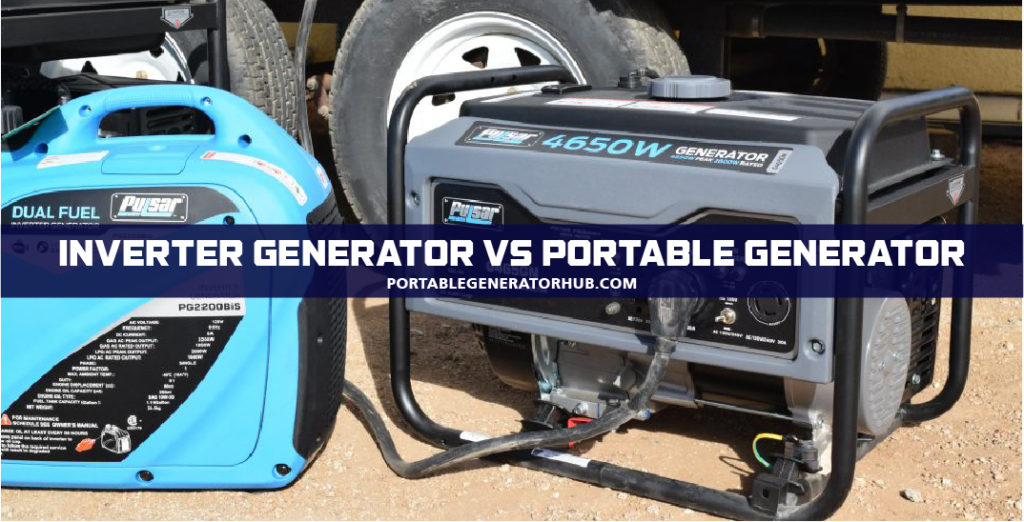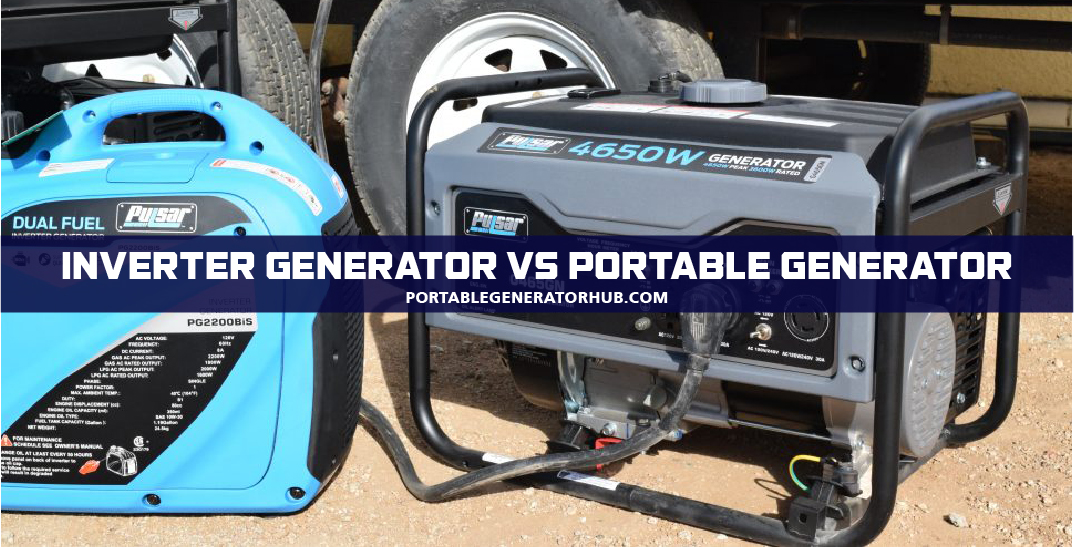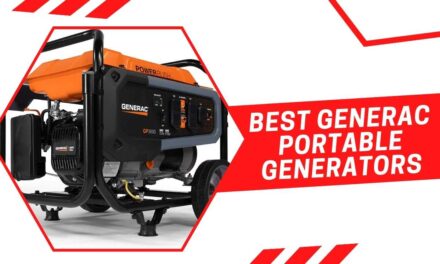
Once upon a time, all we had to choose from were traditional generators. But now there’s a new particular breed called inverter generators that may suit your needs better.
You don’t really have to completely comprehend the technical differences behind the inverter generator vs portable generator debate. All you really need to know is that they have their own set of pros & cons.
What is an inverter generator?
We more or less all know what a generator is and what it does. A generator basically converts mechanical energy into electricity. More often than not, a generator and an inverter generator are used interchangeably, but they are not the same.
An inverter generator converts one type of electrical current to another. It takes direct current or DC and converts it into AC or alternating current. They are mostly used when the power demand is relatively low.
What is a portable generator?
On the flipside, a portable generator is a generator that runs on gas or diesel and provides temporary electricity. It’s basically used in temporary settings such as construction sites. They also provide reliable power when the power goes out temporarily. These generators should be operated in dry seasons in a ventilated outdoor area only for safety purposes.
Differences between an inverter generator and portable generator:
There are clear differences between an inverter generator and a portable generator. Both have a few different mechanisms and capacities.
1. Power Output
A conventional portable generator can run up to 50,000 watts and higher for a limited amount of time. They are ideal when you need a large amount of power in a temporary setting,
whereas an inverter generator has a rating of 1000 to 4000 watts. They aren’t practical when you need enormous power service as they are less powerful unless they have parallel capabilities.
2. Fuel Type
Portable generators and inverter generators both use fossil fuels like – gasoline, diesel, or propane – to run. But an inverter generator only makes enough electricity to meet the demand. Inverter generators are way more energy efficient compared to traditional portable generators. An inverter generator also produces cleaner energy due to this.
3. Noise
We all know how much noise a conventional portable can make. These machines are notorious for it. Noise pollution from generators can be hazardous to health in many cases as well.
In comparison to this, an inverter generator runs much quieter.
Inverters have smaller engines with autoregulation feature, which regulates the speed.
A conventional portable generator runs at a constant speed of about 3600 rpm. As it runs at the same rate, it also constantly makes noises. A conventional portable generator makes twice the noise that an inverter generator makes.
4. Size
Even though portable generators are smaller than traditional generators and are mobile, they still weigh over 100 pounds. Conventional generators weigh more because they have a larger fuel tank that produces more power. In comparison, an inverter generator is much lighter in weight and is smaller in size. This is also because of the fact that the fuel tank is much smaller, and it produces much less power than the conventional portable generators. An inverter generator mostly weighs around 40-60 pounds.
5. Price
A portable generator might just be the most affordable choice when it comes to generators. It’s the cheapest option when a heavy power load is required. It is also cheaper because of been around for so long.
Inverter generators are much more expensive in this case. They are expensive due to having relatively newer technology. It’s also because they have greater efficiency than the conventional option. An inverter generator also makes way less noise and is easier to move around.
6. Portability
Inverter generators came about because their designers were searching for means to produce generators that weren’t as big and heavy as portable generator.
If you have an inverter and also a portable generator both offering 4000 watts, the inverter will be smaller, lighter, and more portable.
Some inverters can work as individual generators for onsite construction workers to enable their power tools. Sure, the portable generators do have handles and wheels. That improves mobility. But try lifting a 200-pound power generator from your car trunk by yourself!
7. Customer Reviews
According to customer reviews, an inverter generator is a safer and cleaner option. It’s also quieter and more efficient. However, many think it’s way too expensive.
On the other hand, a portable generator might have outdated technology and can be a hassle for more than one reason. But it is still pretty popular amongst everyone. It still produces more power than inverter generators.
However, more people seem to be leaning towards inverter generators as the days go on.
7 Advantages of an inverter generator:
- Inverter generators have plenty of advantages that conventional generators don’t.
- Inverter generators are easy to use, easier to move around, and less noisy because of having smaller fuel tanks and an autoregulation feature.
- Inverter generators also use newer technology to make them more efficient.
- Due to only producing the energy needed, they also save up on fuel. An inverter generator doesn’t need to run as hard as a portable generator, which makes it safer for sensitive electronic devices.
- It also produces cleaner energy than the conventional generator does. There’s minimal harmonic distortion due to inverter generators being steadier.
- An inverter generator can be used effortlessly around the house, on construction sites, or in the middle of nowhere while camping because of its portability.
- Many of the new models of inverter generators also have parallel capabilities. Which means there is a way to double the power. If you need to produce a large amount of power, then you connect the parallel power inverter to another inverter of the same model.
Should I buy an inverter or generator?
Looking at all of the reasons previously mentioned, an inverter generator looks like the more desirable option. If you want a generator not to make much noise, be easily movable, and be efficient, an inverter generator is a choice for you. It is also a plus that it uses way less fuel and produces cleaner energy.
But we cannot ignore the fact that inverter generators cannot produce large amounts of power without having another similar model attached to it through parallel capabilities. And an inverter is also way more costly than a regular generator. So, buying two inverter models to get a large amount of power might be unaffordable for many people.
Both of the choices have their own pros and cons. Before buying any of the two options, you should weigh those down and decide for yourself.
Safety Tips:
Some essential safety tips for using any generator would be to:
- Placing the generator outdoors so that there’s no chance of carbon monoxide poisoning.
- Make sure the generator is grounded safely.
- Never running a generator in closed spaces.
- Don’t fill up the fuel tank too much.
- Do not smoke near the generator.
- Don’t touch it with wet hands.
- Don’t operate it in wet weather such as rain or snow.
- Never connect your generator directly to your home’s wiring.
- Make sure to start or stop the generator when there are no electrical loads connected.
- Keep it away from children
- Always disconnect the spark plug wire carefully
Final Words
A generator is essential to any household. And when making a choice to buy one, there are many things to consider. It would be best if you bought a generator from a reliable source and reliable brand, whether an inverter or a conventional portable one.
Inverter generator does have some more advantages than a conventional one as it is made with newer technology. But when it comes to affordability, the conventional generator might be more suitable.
An inverter generator also is a safer option as it produces cleaner energy. It also produces the amount of energy that is needed. But in conclusion, whether you buy an inverter generator or a portable one, you should make sure it caters to your needs perfectly.





